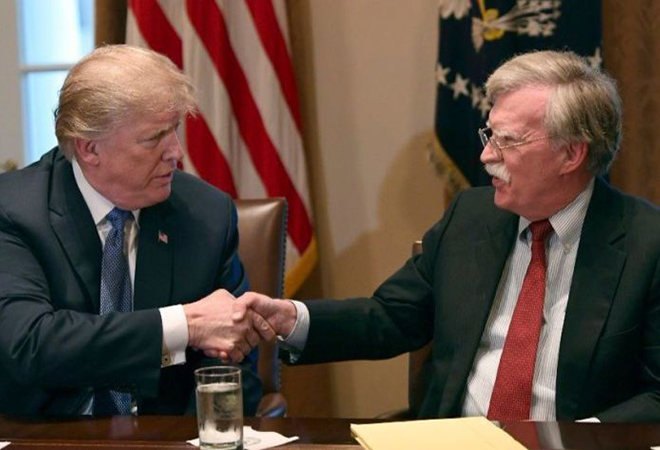-
CENTRES
Progammes & Centres
Location

John Bolton is a deeply unpopular man and that’s a Washington truism. Few arouse the kind of negative emotions he does and fewer can match his ability to crush bureaucratic opponents.
Democrats hate him because he never saw a war he didn’t like or a troublesome country he didn’t want to bomb. They dislike him even more now because he refused to testify during the impeachment proceedings against President Donald Trump and instead waited to tell all for a $2 million book deal.
Republicans used to tolerate him by holding their noses. No more because Bolton has betrayed Trump just five months before the national election in which their fortunes are intimately tied with the president’s prospects.
Bolton’s explosive, tell-all book, “The Room Where It Happened” is to be published next week -- if the publishers can overcome the latest legal hurdle the Trump Administration has thrown their way. But enough eye-popping material is already out from advance copies and the picture is not pretty.
Bolton, Trump’s third national security adviser, unmasks his boss in ways that daily news reports in national newspapers cannot. Or maybe the world has become inured after three-and-a-half years of reading about dysfunction and disorder, once described by analysts in hopeful terms as the much-needed “disruption.”
While that optimism may still be partly justified, Bolton’s revelations about Trump’s wooing of Chinese President Xi Jinping as late as last year will give New Delhi pause. It appears Trump was willing to compromise with China depending on what was in it for him, not necessarily standing for “principles” he may have espoused in public.
As a data point by itself, it shouldn’t be too shocking. All politicians operating in democracies – and American presidents are not holier than others – are always trying to win elections on the one hand and using available and permissible policy options on the other to achieve electoral victory. The difference is that Trump is unfiltered as many have noted and he nearly always says the “quiet” part aloud.
Bolton claims Trump asked Xi to buy more American soya beans and wheat during the G-20 summit in Osaka, Japan, last year to help him in his reelection bid. Trump also apparently bought Xi’s rationale for putting more than a million Uighurs in internment camps, saying it was exactly the right thing to do.
Trump’s get-tough-with-China policy is apparently tied to Trump’s re-election, swinging between China’s inclination to buy more US farm products because it helps him with the Midwestern vote and getting tough with China after the pandemic because the national sentiment has turned against China.
That is the crux of Washington’s wrath against the book. Even Bolton agrees that Trump’s instincts on China are kind of right. “Trump frequently says that stopping China’s unfair economic growth at America’s expense is the best way to defeat China militarily, which is fundamentally correct,” he wrote in The Wall Street Journal on Wednesday.
But Bolton also makes the point that Trump’s advisors are “badly fractured” between “panda huggers” and China hawks – something that’s been well known since the start of this administration. The real problem is that Trump doesn’t stick to even positions he himself has espoused. When faced with Xi, who apparently ran rings around the US president in Osaka, Trump was putty.
"Bolton also makes the point that Trump’s advisors are “badly fractured” between “panda huggers” and China hawks – something that’s been well known since the start of this administration. The real problem is that Trump doesn’t stick to even positions he himself has espoused"
The US president, according to Bolton, pleaded with Xi to help him win his reelection. “You’re the greatest Chinese leader in 300 years!” exulted Trump, amending that a few minutes later to “the greatest leader in Chinese history,” Trump is supposed to have said.
Make what you will of Trump’s tendency to exaggerate and ride on hyperbole to get what he wants but it is disturbing that the leader of the “free world” repeatedly seems to have gone overboard in front of an autocrat to try to please and win favour.
From India’s point of view and especially in light of the current developments on the India-China border, Bolton’s book cannot be a good read. Apart from Trump’s obsequiousness to Xi, his flip-flops on Chinese companies, Huawei and ZTE, are sobering. It seems that Trump used the two companies to grant or withdraw favours to the Chinese and did not seem to see them in the context of US regulations or national security policy that his own administration had crafted with great fanfare.
He reversed measures his Commerce Secretary Wilbur Ross had taken against ZTE and was willing not to prosecute Huawei if he could get a trade deal with China in time.
Trump’s transactionalism is so extreme that even the most hard-nosed may find it difficult to bet on him as a partner. One has to wonder if the institutions he presides over can deliver.
But the axis of adults does exercise influence on Trump – a day after Bolton’s book made headlines, he signed a bill into law that allows sanctions on Chinese officials involved in putting a million Uighurs in camps. The contradictions are hard and difficult to explain. Needless to say, the Uighurs are confused.
In the end the windows of opportunities with Trump are small and can shut any time. Only the most nimble can take advantage.
The views expressed above belong to the author(s). ORF research and analyses now available on Telegram! Click here to access our curated content — blogs, longforms and interviews.

Seema Sirohi is a columnist based in Washington DC. She writes on US foreign policy in relation to South Asia. Seema has worked with several ...
Read More +